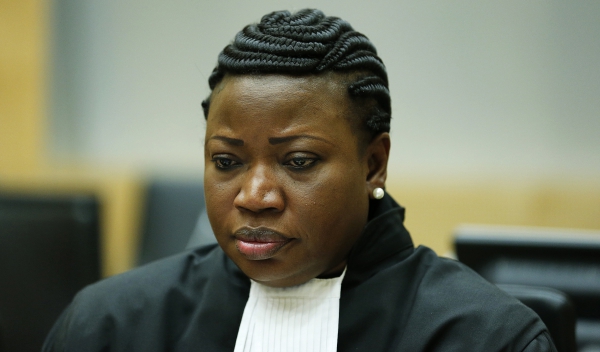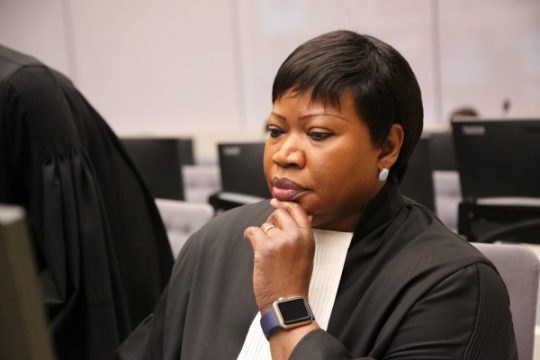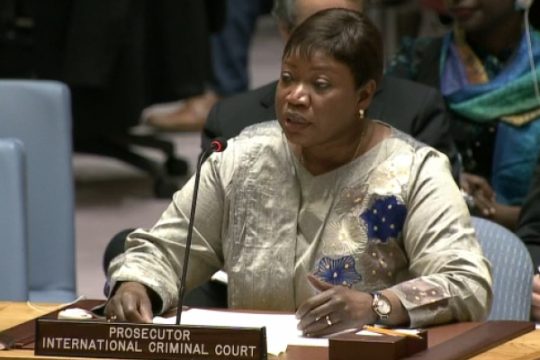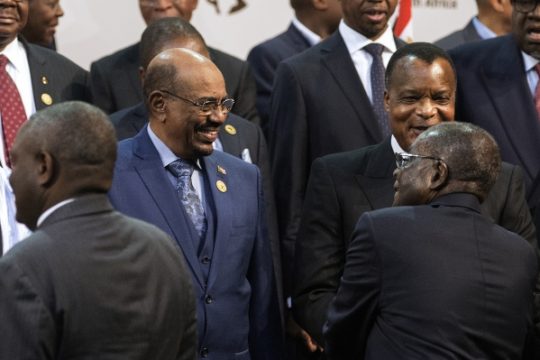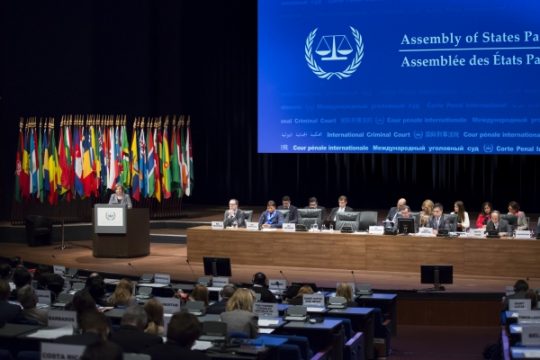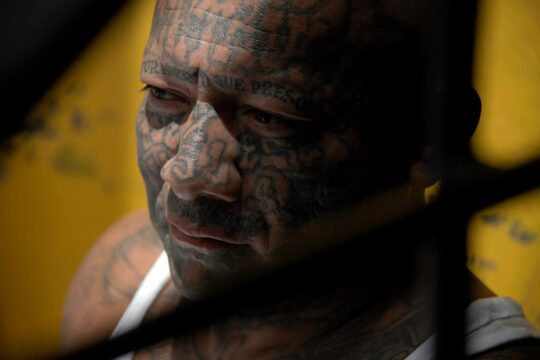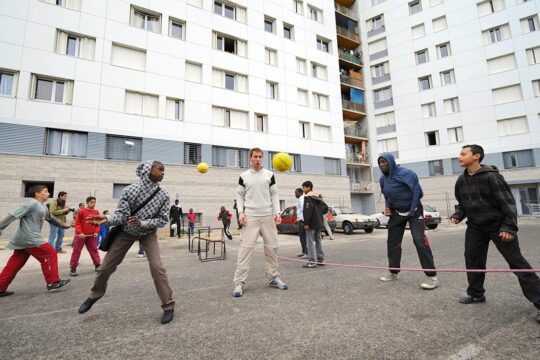International Criminal Court (ICC) Prosecutor Fatou Bensouda has been in her post since June 16, 2012, and is now half way through her mandate. In four and a half years she has opened two new cases -- Mali and Georgia -- and issued an arrest warrant against Malian Jihadist Ahmed Al Mahdi for war crimes. Too little action to date, say observers, but she has numerous cases in the pipeline, notably against the Russians, British, Americans and Israelis. People wait impatiently for her expected opening of an Afghanistan case involving torture by US forces. They see it as a test and possibly a turning point for the ICC and international justice. Here we look at Bensouda’s record half way through her mandate.
One step back, two steps forward. Taking advantage of South Africa’s lead, Gambian dictator Yahya Jammeh decided in mid-October to pull his country out of the founding treaty of the International Criminal Court (ICC). His successor Adama Barrow, emerging victor from the presidential elections, cancelled that decision and, to mark the change he wants to bring to the country after “22 years of injustice and abuse of power”, he chose as Justice Minister former Prosecutor of the International Criminal Tribunal for Rwanda (ICTR) Hassan Boubacar Jallow. But at the ICC seat in The Hague, the announcement of Gambia’s withdrawal had resounded like a personal attack on the ICC Prosecutor, who was named Jammeh’s Justice Minister in 1998 after ten years of senior positions in the judicial system of the small West African country that is Gambia. “Fatou Bensouda is not Gambian she is global!” one lawyer nevertheless remarked with a smile. After a brief interlude as a legal advisor for a commercial bank, Bensouda in 2000 joined the ICTR, where she served alongside her future ICC deputy James Stewart and Stephen Rapp, who would become US ambassador for war crimes under Obama.
Two cases and one arrest warrant
After Bensouda’s election as ICC Prosecutor at the end of 2011, many member States hoped for a change in the Court’s relations with Africa, which had become strained following the announcement in July 2008 of an arrest warrant for Sudanese President Omar Al Bachir and then for Uhuru Kenyatta, who was elected President of Kenya in 2013 despite the arrest warrant against him. When Bensouda took up her post on June 16, 2012, she inherited the badly put together cases of her predecessor Luis Moreno Ocampo, with whom she nevertheless shares responsibility, since she was his deputy for eight years. “When this Prosecutor started in 2012, it was becoming more and more evident that prosecutorial and investigative methods and strategies used by the Office of the Prosecutor in its first years were not holding up in the courtroom,” explains Elizabeth Evenson of Human Rights Watch (HRW). "Within the Prosecutor’s first year in office, Uhuru Kenyatta and William Ruto would be elected as President and Deputy President in Kenya, leading to an escalation of political attacks on the court’s legitimacy.” But she says that since Bensouda took office, “we’ve seen important changes announced in strategy, and a raising of standards when it comes to investigations. The Prosecutor has also moved forward in issuing some key policy documents”, she says, notably on sexual crimes, child soldiers and case selection criteria. However, it is difficult to assess Bensouda’s direction, according to Professor William Schabas, “because there has not been so much action”.
In four years, Bensouda has opened two cases: Mali in January 2013, and three years later, the summer 2008 war between Georgia and Russia in South Ossetia. That investigation is stuttering, while only one arrest warrant for war crimes was issued and executed in five years -- against Malian Jihadist Ahmed Al Mahdi -- out of the ten cases under way. Al Mahdi was detained in Niger and rapidly transferred to The Hague in September 2015. When he got to court, this former Islamic morality brigade chief decided to plead guilty to the destruction of mausoleums in Timbuktu, at the time occupied by Jihadists of Ansar Dine and Al-Qaeda in the Islamic Maghreb (AQMI). The case was expedited quickly and ended in September 2016 with a 9-year prison sentence. “I think this is probably the best case that the ICC ever had,” says researcher Mark Kersten. “They managed to get cooperation from two states, Niger and Mali. They also successfully convicted someone in an incredibly short period of time, on allegations of war crimes for a cultural crime, which is a crime that resonates quite widely right now, given ISIS destruction of cultural heritage and that of the Taliban.” Kersten, author of “Justice in conflict” (Oxford), also reminds us that Al Mahdi’s confessions could lead to more arrest warrants in the near future.
ICC eyes Russia, US, UK and Israel
To assess Bensouda’s first years, we need to look at her preliminary examinations, which are the first step to possible investigations. In May 2014, the Prosecutor decided to reopen the case on torture perpetrated by British forces in Iraqi prisons, which had been discreetly closed by her predecessor eight years earlier. She then opened a preliminary examination on Palestine in early 2015, following a request from the Palestinian Authority, which ratified the ICC treaty at the same time. A year later, she concluded her preliminary examination on South Ossetia and obtained the judges’ authorization to open investigations. Finally, in what is no doubt her most remarkable decision, she announced that there would be conclusions “very shortly” on Afghanistan, targeting crimes committed by American forces. Investigations and preliminary examinations now involve Russia, the UK, the US and its Israeli ally. Schabas says we must wait to see the significance of all this, and that international justice has always been controlled by States in the UN Security Council, even before the Security Council existed. In her November report, Bensouda said she was looking at crimes, notably acts of torture, committed by US forces in Afghanistan and elsewhere, including by the CIA in secret prisons in Europe where suspected members of Al Qaeda and the Taliban were transferred from Afghanistan. “Members of the US armed forces and the US Central Intelligence Agency (CIA) resorted to techniques amounting to the commission of the war crimes of torture, cruel treatment, outrages upon personal dignity, and rape,” according to Bensouda’s report. It says “the gravity of the alleged crimes is increased by the fact that they were reportedly committed pursuant to plans or policies approved at senior levels of the US government, following careful and extensive deliberations”, and that there is a reasonable basis to believe these crimes “were committed in furtherance of a policy or policies aimed at eliciting information through the use of interrogation techniques involving cruel or violent methods which would support US objectives in the conflict in Afghanistan”.
Secret prisons in Europe
The declarations of new US President Donald Trump further underline the need for ICC action. Trump used his first TV interview as President to say he believes torture “absolutely” works, including waterboarding, and the US should “fight with fire” in its efforts to tackle Islamic terrorists. “"I have spoken with people at the highest level of intelligence and I asked them the question 'Does it work? Does torture work?' and the answer was 'Yes, absolutely',” he told ABC News on January 25, 2017. The new President was reiterating declarations made during his campaign, during which he urged a return to the “enhanced” interrogation methods of the George W. Bush era. The secret prisons, which came to light in 2005, were the subject of an investigation by the Council of Europe. In June 2007, Swiss Senator Dick Marty said the system of secret prisons was an “international spider’s web” of detentions and illegal transfers by the United States, in collusion with several European countries. Since then, these States have been urged to open investigations, but have hidden behind state security. In her November report, the ICC Prosecutor said she had asked Poland, Romania and Lithuania, all States Parties to the ICC, to inform her of any investigations under way. On the margins of an international security conference in Munich from 17 to 19 February, Bensouda met notably with Afghan President Ashraf Ghani, as well as the Foreign Ministers of Romania and Lithuania. But the Prosecutor has still not filed her request for investigations with the ICC judges. “Pursuing the issue of torture by the US is an issue of great global importance,” says William Schabas. “It would show that the US can also be brought to justice. You cannot do it with the UN Human Rights Council because it is a political body, you cannot do it with the Security Council for obvious reasons. Only the ICC can do it.” For the first time, it would be about “a president who sent his army to fight in another country,” he stresses.
“There is a lot of debate about whether this will happen, about the wisdom of doing this, but it is why the ICC was created,” says Mark Kersten. “We can imagine that the US may have a very bad relationship with the ICC, with the Trump administration, but in fact with any administration if they are going to focus on alleged crimes committed by US officials.” He says there have been a lot of expectations during the ICC’s first 15 years, but there is now hope that it will “finally speak justice to power”. William Schabas thinks the ICC must insist on the impartial nature of justice, because if it continues to target only conflicts with national or regional impact, “there is a danger that it will become a very irrelevant institution”. The ICC Prosecutor cannot afford to fail on these highly sensitive cases, and observers think she cannot go back. Karine Bonneau of the International Federation for Human Rights (FIDH) thinks that opening investigations on Georgia and moving the preliminary examination on Afghanistan forward would show the Court’s relative independence on those cases, and that this is a test for the ICC. Whilst observers wait for an announcement, they nevertheless hail recent developments. “Even examining the conduct of the US, UK, Russia and Israel, even what might be seen as a very minimalist measure, it’s a shift,” says Professor Schabas.
Preliminary examinations, source of pressure
The ICC’s preliminary examinations, sometimes open for years – ten years in the cases of Colombia and Afghanistan – are a way of “naming and shaming”, according to Schabas of Middlesex University. “It has a very good impact, even if difficult to measure,” he comments. Karine Bonneau says a preliminary examination that lasts 10 years is “unacceptable”, but that without the ICC there would not have been the same pressure for justice in Colombia, and if the Prosecutor were to open a preliminary examination in Mexico, the authorities there would start to act. The Statute of Rome, founding treaty of the ICC, was adopted in 1998 at a time when the Cold War was history. The Court was set up in The Hague, Netherlands, in 2002, a few months after September 11. Today, the Prosecutor “faces an era that is completely different from the time of the Court’s creation, what with the opposition of African States, the arrival of Trump and the financial crisis that encourages States like France to cut the budget”, says Karine Bonneau. If there are cases on the table, decisions are painfully slow, which could give the Court’s opponents time to rally their troops. In November 2016, on the first day of the ICC General Assembly, Moscow announced it was removing its signature from the Treaty of Rome (Russia has not ratified it, but has signed it). It was a symbolic announcement, designed to support the ranks of the African malcontents.
The absence of decisions on pending cases is a cause of concern. Three trials are currently under way -- Laurent Gbagbo and Charles Blé Goudé, Bosco Ntaganda and Dominic Ongwen – but there might be a long absence of accused persons in the box in coming years. Whether in the Central African Republic, Mali or Côte d’Ivoire, we are still waiting for more arrest warrants. As for Libya, the ICC’s announcements “have not had a positive effect with regard to violence”, says Mark Kersten. Since May 2016, Bensouda has been telling the UN Security Council, which referred to the ICC crimes committed in Libya since 2011, that she is ready to issue arrest warrants. Gaddafi’s cohorts are still her prime target, but the Prosecutor has also spoken in recent years of crimes against the Tawerghas, those perpetrated by the forces of Colonel Haftar and Islamic State, and recently against migrants. “The Office of the Prosecutor has taken the position of seeing Security Council referral on Libya as being limitless, which for the Court is basically treating Libya as a Member State,” says Mark Kersten, who regrets that “neither Ocampo nor Bensouda have investigated opposition crimes”.
The Prosecutor has signed an agreement with the Libyan authorities to share prosecutions of Gaddafi supporters, giving the ICC responsibility to hunt them abroad. If new cases are opened, it will be difficult for the ICC to give Libya a blank check to prosecute on its own soil. On February 21, the office of the UN High Commissioner for Human Rights and the UN mission in Libya said trials of former Gaddafi supporters in Libya did not meet international norms and that deep reforms of the Libyan justice system were necessary. They also called for a moratorium on the death penalty. These conclusions are hardly a surprise. Only the ICC had deemed the Libyan judicial procedures viable when it referred the Senoussi case back to the Libyans in summer 2014. “I believe the OTP should have taken the initiative a long time ago to re-challenge the admissibility in Senoussi case,” says Mark Kersten.
“In the course of his mandate, the first ICC Prosecutor Luis Moreno Ocampo took up all the easy cases, people who were already in detention like Thomas Lubanga or Laurent Gbagbo, and cases targeting militia opposed to the sitting authorities so the Court would get good cooperation,” says one ICC official. “But now, things are more complicated.”



